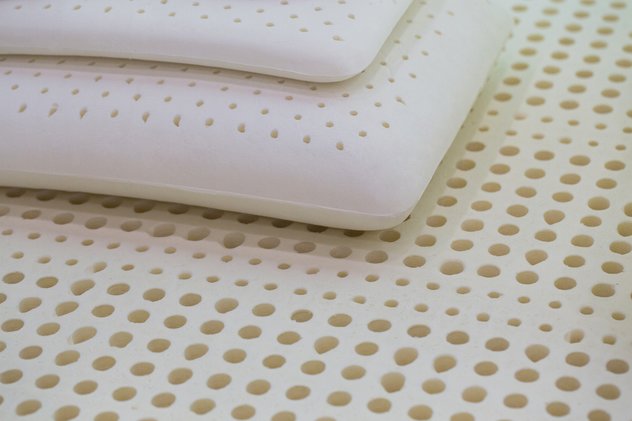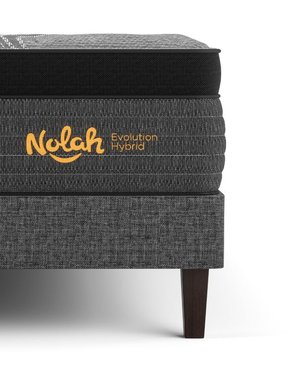Dunlop vs. Talalay Latex | What's The Difference?
On the hunt for your next mattress? Choosing a mattress type is the first decision you’ll have to make—and the most important. Each type of mattress has a distinctive feel and unique advantages, and the construction you choose determines how much your new mattress will cost and how long it’ll last.
Natural latex mattresses may not be the most affordable, but they are the most environmentally friendly. Plus, they’re soothing, supportive, and ultra-durable. If you’ve decided on latex for your next bed, rest assured; it’ll be a worthwhile investment!
As you explore your options, you’ll come across terminology that may be unfamiliar if you’ve never purchased a latex mattress. So, to help you find your ideal sleep setup, we’ve compiled a comprehensive guide to two of the most common forms of latex used in mattresses: Talalay latex and Dunlop latex.
Introduction to Latex in Mattresses
Talalay and Dunlop are both natural latex foam varieties. Their main ingredient is liquid latex, sustainably harvested from rubber trees. You may see synthetic latex mattresses while you shop around, but in this article, we’ll focus on the good stuff: eco-friendly, natural latex.
What Is Latex Foam?
How does the sap-like liquid extracted from Hevea brasiliensis trees become a cushioning mattress material? It’s made into a foam with the help of heat, air, water, and a few additives, depending on the manufacturer.
While Dunlop and Talalay latex use the same base material, these mattress foams undergo different manufacturing processes. Their unique processing methods set Dunlop and Talalay latex apart and yield foams with distinct properties.
Note: A single mattress may use all Talalay latex, all Dunlop latex, or both! As we’ll discuss later on, Talalay and Dunlop have distinct qualities and work best for different applications.
How Dunlop Latex Is Made
Of the two natural latex types, Dunlop latex foam is the simpler to produce. Learn more about the five-step process below:
- 1)
The liquid latex is mechanically whipped until it has a frothy texture
- 2)
The froth is poured into a mold, filled all the way
- 3)
The mold is baked in a vulcanization oven
- 4)
The foam is removed from the mold and washed
- 5)
The foam is baked a second time, removing moisture
How Talalay Latex Is Made
Manufacturing Talalay latex foam requires a more intensive process than Dunlop. Here’s how it’s made:
- 1)
The liquid latex is mechanically whipped until it has a frothy texture
- 2)
The froth is poured to partially fill the mold
- 3)
The mold is vacuum sealed, and the frothy liquid expands
- 4)
Its flash frozen
- 5)
The mold is baked, which sets and solidifies the foam
- 6)
The foam is removed from the foam, extensively washed, and dried
Talalay Latex and Dunlop Latex Differences
These mold filling, setting, and baking processes may not sound drastically different, but they produce two unique mattress materials. Let’s compare the main differences between Dunlop and Talalay latex in essential areas for sleep comfort.
Feel
Both Dunlop and Talalay latex gently contour to your curves, relieve pressure, and have a responsive touch. Latex foam is known for its buoyancy and bounce—when you remove pressure, it instantly returns to its original shape. This quality makes latex popular for restless sleepers. However, it does give latex less motion isolation than memory foam.
Density is where Talalay and Dunlop latex differ. Dunlop is denser, making it more common for support layers in latex mattresses. With a lower density, Talalay latex feels more cushioning and is favored for the comfort layers in latex and latex hybrid mattresses.
Note: While Dunlop latex is denser than Talalay, both foam types can be engineered in a range of firmness levels.
Breathability
Talalay latex has a more breathable structure than Dunlop latex, so it sleeps slightly cooler. This difference stems from the vacuum seal and expansion step of creating Talalay latex, which results in a more porous foam.
That said, both Talalay latex and Dunlop latex have temperature-neutral formulas. It's also common for latex mattresses to have perforated foam layers, which further promotes cooling air circulation.
Durability
All natural latex foam is exceptionally resilient, far outlasting memory foam and other polyfoams. However, because of its higher density, Dunlop latex is slightly more durable than Talalay.
Consistency
During the Dunlop latex manufacturing process, the liquid latex settles in the mold, and the heaviest particles sink to the bottom. As a result, Dunlop latex has a bottom-heavy feel. With Talalay latex, the frothed liquid is vacuum sealed and expands to fill the mold, creating a uniform consistency throughout the foam.
Cost
As previously mentioned, the Talalay process is more labor-intensive than the Dunlop process. In turn, Talalay latex costs more. Click here to learn more about the average mattress cost in 2023.
Pros and Cons of Dunlop and Talalay Latex
Dunlop Latex
Pros
Natural and eco-friendly
Hypoallergenic
Pressure-relieving
Responsive
Temperature-neutral and breathable
More durable than Talalay latex
Cons
Less breathable than Talalay latex
Bottom-heavy
Use
Often used for support layer in all-latex and latex hybrid mattresses
Talalay Latex
Pros
Natural and eco-friendly
Hypoallergenic
Pressure-relieving
Responsive
Highly durable
Temperature-neutral
More breathable than Dunlop latex
Consistent feel
Cons
Costs more than Dunlop latex
Slightly less durable than Dunlop latex
Use
Often used for comfort layer in all-latex and latex hybrid mattresses
Consumer Guide: Choosing the Right Latex for You
Now that you know the ins and outs of each natural latex type, you can make an educated decision for your sleep setup. But remember, Talalay and Dunlop latex are very similar and both are excellent options. The critical decision isn't between Talalay and Dunlop; it's between latex foam and other materials like our Nolah AirFoam™ or memory foam.

Latex Mattresses
Our Recommendation: Dunlop and Talalay
For an all-foam latex mattress, we suggest a combination of Dunlop and Talalay latex. Look for a model with Talalay latex comfort layers for maximum cushioning and Dunlop latex underneath for optimal support.
Latex Hybrid Mattresses
Our Recommendation: Personal Preference
Latex hybrid mattresses pair latex foam with a coil core for even deeper support. These two-in-one mattresses are ultra-durable, and coils maximize edge support. Higher-end models may also have advanced features like zoned, individually-wrapped coils for targeted relief and heightened responsiveness.
With multi-layer construction, hybrid mattresses offer a healthy balance of comfort and support. Talalay and Dunlop latex work great for hybrid applications, adding responsiveness and pressure relief. We don't recommend one over the other—the ideal option comes down to your personal preference. You may also see hybrid models that use both.
Mattress Toppers
Our Recommendation: Personal Preference
Both Dunlop and Talalay latex mattress toppers add pressure relief and support to a mattress. We recommend choosing the material based on the shortcoming you want to fix. If your mattress doesn’t offer enough cushioning, choose Talalay. If you want a slightly denser feel, go with Dunlop. Either way, buying a mattress topper will improve the feel of your bed and help it last longer.
Pillows
Our Recommendation: Talalay
Cooling is key for pillows, so we suggest Talalay latex, the more breathable option. Look for an option with a breathable cover material as well, like Tencel™, or organic cotton.
Natural Comfort with Talalay or Dunlop
Hopefully, this guide has clarified the key differences between the two natural types of latex foam and helped you pick the right composition for your next mattress. But whether you choose Dunlop, Talalay, or a combination of both, you're ultimately investing in a sustainable, durable, and comfortable sleep solution. You’ll enjoy latex foam’s responsive bounce, gentle contouring, and soothing pressure relief for years of restorative nights supported by nature!
Frequently Asked Questions
About Talalay vs. Dunlop Latex
Disclaimer: Nolah does not provide medical advice. All resources on the Nolah blog, including this article, are informational only and do not replace professional medical counsel. Talk to your doctor about any health, mental health, or sleep-related issues.
You May Also Like These Articles
Don't Sleep on Exclusive Offers
Sign up for our newsletter, and you'll be the first to know about discounts, deals, and what's new at Nolah.
Ready for Bed?
